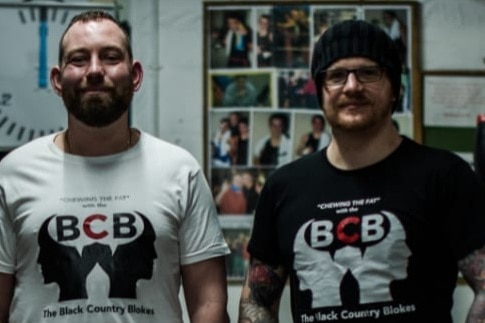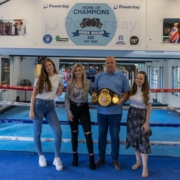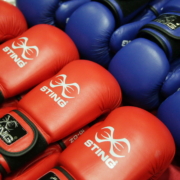
This Is Me, This Is Us: Kevin Dillon’s Mission to Support Men’s Mental Health
December 19, 2024 | by Nabillah Akhtar
Kevin Dillon from Lions ABC isn’t just a boxing coach – he’s a champion for mental health in his community. He’s recently kicked off an amazing campaign called ‘This is Me, This is Us,’ all about encouraging open conversations about how we’re feeling, especially in the amateur boxing community and clubs.
We recently sat down with him to talk about his passion for mental health and the difference he’s making in his community. On top of his campaign, he also runs a podcast with his coaching buddy, where they dive into the ups and downs of men’s mental health. They keep it real, sharing stories and starting the kind of chats that can make a real difference. Kevin’s proving that in and out of the ring, strength comes from being open and supporting each other.
Kevin, tell me about yourself, what work are you doing in this area?
I’m one of the hosts of a podcast called, ‘The Black Country Blokes’. Me and one of my other Boxing coaches, Lee Cadman started this up in 2019 to break down the stigma around men’s mental health. With one man dying by suicide every two hours to suicide, this is a pandemic we want to end.We get men from different organisations to talk about their struggles and their victories.
We’ve just released a campaign called, ‘This is me, this is us’ where every day it’s going to come out like an advent calendar – showing that people are multi-faceted, they can be confident, strong and proud but can also be suffering from depression, anxiety and things that hold them back from life. So it’s demonstrating to everyone, that this isn’t just you dealing with these issues, this is me, this is us. Together, we can beat this.
What made you want to do this in the first place?
The reason we started talking about it is because I lost my eyesight when I was very young, at the age of three. I always say that I’ve got more baggage than Heathrow Airport! I went through all of my trials and tribulations, the only way I could talk about it in my youth was by drinking or through other ways. It was my coping mechanism in order to get through it, but from being able to talk – it’s been like having a superpower. Showing that I don’t have to carry this with me anymore, the more open I am with people, the more they’ll open up to me; especially in the boxing club.
You see people who are in the trenches, going through the day-to-day struggles. So you’re talking to these young and old people and seeing that it’s not a thing that only exists in one particular community. Mental health can affect anyone at any stage. We’re trying to show people that you’re not alone. It’s strength in numbers and once you see it’s not only happening to you…it’s like a release.

Do you feel like the stigma around mental health is changing?
I believe that we are moving in the right direction. When Covid-19 happened, we started the podcast well before this but what we found was, if anyone had pre-existing problems in this area it’s almost as if they had thrown petrol on a very angry fire in lockdown – it just got worse.
If you hadn’t had previous problems, lockdown gave you a taste of it. The isolation, loneliness, the paranoia – so it’s good that people are talking about it now, but I feel as though there’s not enough action being done.
What do you think needs to be done?
After the pandemic, I made sure we were open every week – Monday to Friday from 10.30am-11.30am for men and then 11.30am-12.30am for women…so it fits in around their family life and school drop offs. We’ve created a safespace for them to talk for free, they’re around likeminded souls, they’re exercising to release endorphins, but if they want a chat they can do too.
In Lockdown, we did a support group upstairs (we found a legal loophole), so we managed to get people around talking about it.
From my experience, men prefer to do an activity and then do all the talking afterwards, so they’re not just sitting idle. This way, the conversation naturally comes out in people and because I’ve made it so known that I do work in this area – I’ll have people approach me about my panic attacks and ask questions and before you know it they will have resonated or discussed something that they’ve been through.
We’re essentially just getting men to talk organically rather than it feeling forced.
What advice would you give to other clubs who aren’t as active in this area?
I’d love for England Boxing to hold a mental health first aid course – as part of your wellbeing. At the moment, there is physical first-aid and safeguarding course. With those areas it’s more obvious if someone needs help whereas with mental health, if someone is struggling you could walk past 10 people going through something and not have a clue.
If we get boxing at the forefront of this before any of the other sports that would be ace, if we could give them that love, we’ll stop it at the root.

Tell me more about the award that you’ve recently won…
We’re really proud about this, the ‘Black Country Blokes’ podcast have won the Kings Award, the highest honour any charity or CIC can get. We record the record it upstairs in my boxing club, we want to normalise that everyone will go through this at some point in their lives, feel the emotion but don’t drown in it. There is light at the end of the tunnel.
How do you look after your own mental health?
Me and Lee both tend to check in with each other a lot, we’ll have a phone call and if we sense one of us is about to have a wobble – we advise each other to go and have a counselling session with a professional.
I also signpost a lot of people to mental health organisations, not only do I send this on but I use the resources and information myself too.
If you or someone you know is struggling with mental health, don’t stay silent. Help is available. Reach out to friends, family, or a mental health professional. Remember, it’s okay to not be okay. For more resources, visit the England Boxing Mental Health area.
Catch more inspiring conversations on Kev Dillon’s podcast, ‘The Black Country Blokes,’ available to listen here. Let’s keep the conversation going.











